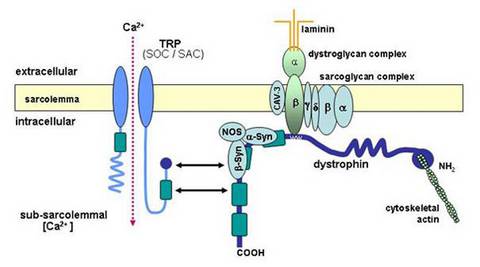Objectives:
The Laboratory of Molecular Neurophysiology is part of the Institute of Pathophysiology at the Ernst Moritz Arndt University of Greifswald. Our overall objectives are to characterize gene expression, localization and function of ion channels that are responsible for the influx of calcium ions into muscle fibres. Calcium influx and calcium content of cells are normally strictly regulated and play important roles for cell function and survival. Aggravated calcium influx can lead to muscle damage and muscle weakness and seems to play a key role in muscular dystrophies. Blockers of ion channels that inhibit or normalize calcium influx may be useful to develop pharmaceutical substances for the therapy of certain muscle diseases.
Duchenne muscular dystrophy (DMD) is characterized by the loss of the sub-sarcolemmal protein dystrophin. The loss of dystrophin leads secondarily to the absence of many binding partners of dystrophin, the so called dystrophin-associated glycoproteins (DAGs). DAGs include sarcoglycans, dystroglycans and syntrophins. Recently it has been shown that ion channels of the transient receptor potential (TRP) family of cation channels can bind to dystrophin. The absence of dystrophin in DMD muscle may lead to abnormal channel function and could explain the increased sub-sarcolemmal Ca2+ concentration observed in dystrophin-deficient muscle fibres.

- Fig. 1 Organization of the dystrophin-glycoprotein complex in muscle fibres and its possible connection to Ca2+ conducting channels of the sarcolemma. In normal mammalian muscle dystrophin connects cytoskeletal actin via the dystroglycan complex (α;, β) to laminin in the extracellular matrix. Other proteins are associated to the macromolecular complex: the α;, β, γ, and δ-sarcoglycans, caveolin-3 (CAV-3), α- and β-syntrophin (Syn) and the neuronal isoform of the nitric oxide synthase (NOS). Further, there is evidence that certain binding motives at the C-terminus of dystrophin can bind to ion channels of the transient receptor potential (TRP) family of cation channels. These channels are thought to function as store operated (SOC) and stretch activated (SAC) Ca2+ conducting ion channels of the sarcolemma.
The aim of the project is to improve our understanding of ion channel expression, localization and function in skeletal muscle and the possible contribution of membrane channels to the pathomechanism of muscular dystrophies. Advanced techniques, like confocal microscopy in combination with special cell physiological methods will be established in collaboration with the strategic partners. Further, mice with single or multiple genetic defects will be studied to elucidate pathomechanisms related to neuromuscular diseases. To study the localization of ion channels in living cells, fluorescent reporter molecules will be generated in collaboration with the Institute of Human Genetics. The research should lead to new therapeutic approaches for muscular dystrophies.
Description of the key personnel to be involved in the project:
Prof. Dr. Heinrich Brinkmeier [WP leader]
Dr. Bernd Pritschow [Coworker]
Dr. Christiane Kunert-Keil [Coworker]
Dipl. Biol. Mirjam Krautwald [Coworker]
Strategic partners:
Prof. Hanns Lochmüller
Institute of Human Genetics (IHG) in Newcastle up on Tyne, UK
Prof. Volker Straub
Institute of Human Genetics (IHG) in Newcastle up on Tyne, UK
Recent publications related to the project:
- Kunert-Keil C, Bisping F, Krüger J, Brinkmeier H (2006) Tissue-specific expression of TRP channel genes in the mouse and its variation in three different mouse strains. BMC Genomics 7:159.
- Krüger J, Kunert-Keil C, Bisping F, Brinkmeier H (2008) Transient receptor potential cation channels in normal and dystrophic mdx muscle. Neuromuscul. Disord. 18:501-513.
Partners in Europe
Institutions in Greifswald
- University of Greifswald
Department of Neurology
Laboratory of Molecular Neurobiology
Ellernholzstraße 1/2
D-17489 Greifswald - University of Greifswald
Department of Neurology
Laboratory of Movement Disorders
Ferdinand-Sauerbruch-Straße
D-17489 Greifswald - University of Greifswald
Institute of Pathology
Department of Neuropathology
Friedrich-Loeffler-Str. 23e
D-17489 Greifswald - University of Greifswald
Institute of Pathophysiology
Greifswalder Straße 11c
D-17495 Karlsburg - BDH-Klinik Greifswald
Karl-Liebknecht-Ring 26a
D-17491 Greifswald




